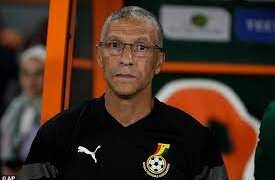A major refereeing blunder and serious security concerns overshadowed Wednesday’s games at the African Cup of Nations in Cameroon.
The referee in charge of the Mali-Tunisia game caused chaos by twice blowing the final whistle too early, incensing coaches on the losing team, and causing a lengthy debate about whether the match would have to be restarted.
Mali was ahead 1-0 when referee Janny Sikazwe of Zambia ended the game early in the western city of Limbe. But it was Tunisia that refused to come back out 30 minutes later when officials tried to restart the match, with the coach saying his players were already in their ice baths by then.
While the farcical scenes created more negative headlines for the tournament, there were more serious concerns away from the matches.
The Cameroon news agency reported that a gun battle between separatist rebels and government soldiers left two dead and five injured in Buea, a city 20 kilometers (12 miles) from Limbe and where the Mali squad is based. “Heavily armed” rebels fired guns indiscriminately near a training stadium used by the Mali squad, the Cameroon news agency said.
The fighting was a stark reminder that Cameroon’s African Cup is not just unfolding under the shadow of the coronavirus, but also during a far less publicized but violent rebellion playing out in the western part of the country. The fighting is precariously close to where Group F teams Mali, Tunisia, Mauritania and Gambia will operate.
And if that wasn’t enough problems to contend with on Day 4, the sound system temporarily failed at Limbe Stadium before the day’s second game, causing Mauritania and Gambia players to stand around waiting to sing national anthems.
There was one feel-good moment at least: Gambia’s Ablie Jallow sent a shot arrowing into the top corner from outside the penalty area to give his country a 1-0 victory in its first appearance at the continent’s soccer showpiece.
Max-Alain Gradel scored with an equally-good long-range shot in the sixth minute to give 2015 champion Ivory Coast a 1-0 win over Equatorial Guinea in Wednesday’s last game. It meant nine of the first 12 games at the tournament have ended 1-0.
But there’s no doubt which incident was the talking point of the day.
With Mali leading Tunisia 1-0, referee Sikazwe first blew for full time after only 85 minutes. He seemed to realize his big blunder and restarted the game.
He then sent off Mali substitute El Bilal Touré in the 87th minute for a rash tackle — also a questionable decision. But Sikazwe blew full time again about 20 seconds before the 90 minutes were up, according to the clock at the stadium and on TV broadcasts. About three minutes of added time had been expected.
The second early whistle infuriated Tunisia coach Mondher Kebaier and other members of the coaching staff. Kebaier ran to confront the referee while pointing angrily at his own watch and Sikazwe had to be escorted from the field by security officials. One of the match officials shoved a Tunisian official during the commotion, stoking the situation.
There were then suggestions that the game would be restarted and reports that organizers had burst into Mali’s post-game news conference and told coach Mohamed Magassouba that his players had to get back on the field to play another three minutes.
Officials gathered on the field about 30 minutes after the game ended and were seen in discussions. Mali players also came back out but Tunisia refused to re-start the game.
“The players were in their ice baths and then he (the referee) asked us to come back out,” said Tunisia coach Kebaier. “In 30 years in this business, I have never seen anything like it.”
There was no official word from the Confederation of African Football on any decisions made over the game and it appeared the 1-0 win for Mali would stand.
Sikazwe was temporarily suspended by CAF in 2018 following accusations of match-fixing for his performance in charge of an African club game. The Zambian was an official at the World Cup in Russia earlier that year and refereed two games there.
Ibrahima Koné scored from the penalty spot for Mali’s goal after a handball by Ellyes Skhiri. Tunisia was awarded a late penalty, also for handball, and after a video review by Sikazwe. Tunisia captain Wahbi Khazri had his powerful penalty saved. Mali held on with 10 men after Touré’s red card, although not for as long as they should have had to with Sikazwe ending it early.
The violence in Buea led to more questions over why organizers chose it as a suitable base for African Cup teams considering the volatile situation. Buea, the regional capital, has seen many deadly clashes because of an insurrection by English-speaking separatists. More than 3,000 people have been killed in the fighting across the western part of Cameroon since it erupted five years ago.
There was a heavy police and military presence outside the Limbe Stadium and a military helicopter hovered overhead during the Mali-Tunisia game.
Afrinews





























